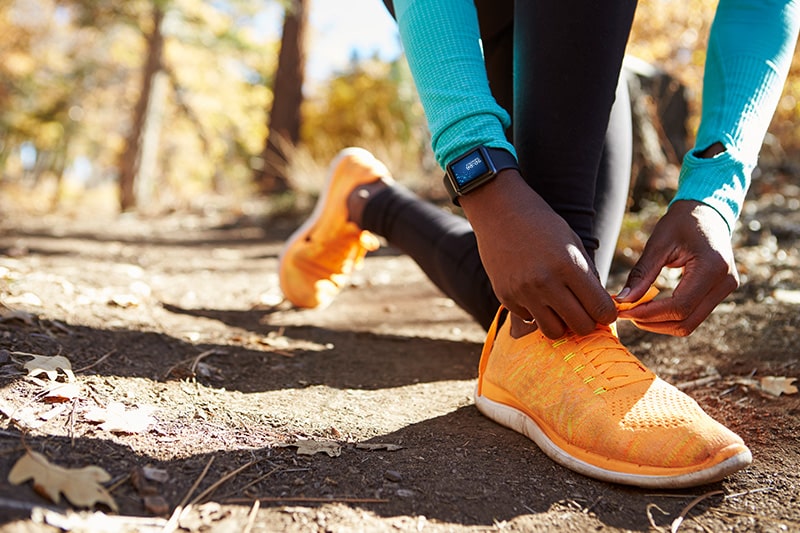Is Wearable Tech Helping or Hurting Your Health?

Wearable tech is cool. There’s no denying that. And where the worlds of wearable tech and health and fitness collide can be even more exciting. It seems like everyone has some sort of device strapped around their wrist, measuring steps and sleep and calories burned. Users compete using fitness apps connected to their devices for total step domination. It’s a lot of fun. But it might not be anything more than that.
Often, trackers are inaccurate, misused or could even work against you and your fitness goals. It all depends on your reliance on them. Here’s what wearable tech is good for, where it falls short and how to make your fitness tracker work for you.
Keeping Track Of Your Health

The whole point of wearable tech and fitness trackers is to have an easy way to keep tabs on your health, right? So what exactly are you getting when you slap that sleek band on your wrist? According to Johns Hopkins, you could be doing your heart a favor. Johns Hopkins Medical claims that using a fitness tracker has been shown to increase the number of steps you take each day by more than a mile, which can improve heart health.
Johns Hopkins points out that using a fitness tracker can also help you set and stick to a solid goal when it comes to activity. It can take the mystery out of just how many steps you’re getting and help you set a clear goal for improvement. “It gives people information and empowers them to start making changes for their heart health, Johns Hopkins cardiologist Seth Martin, M.D., M.H.S. said. “And often, their activity level was not something they were paying attention to before they started tracking.”
According to Men’s Health, wearable tech is advancing to a point where it could do much more than keep you moving. Medical-grade wearable sensors are on the horizon and with that comes much more than step counting. A new pair of shoes from Under Armor could sense muscle fatigue with just a jump. You may soon even be able to use technology to gauge your stress level and manage your emotions.
Tracking Your Sleep
![]()
Arguably one of the most fun metrics to measure with wearable tech is sleep. Did you get a solid eight hours? How long after your head hit the pillow did you drift off? Did you rest peacefully or unknowingly spend all night tossing and turning? Wearable tech makes it possible to track all of this and see if you’re really getting the quantity and quality of sleep that you need, although the information you’re getting might not be completely accurate.
According to LiveScience, experts are still skeptical about how precise wearable technology with sleep trackers can be. The accelerometers often used in sleep trackers detect motion, speed of motion and direction in sleepers. And while this is enough information to tell the difference between someone who is sleeping and someone who’s awake, it might not be accurate enough for measuring sleep cycles or restlessness. It’s just too prone to mistakes. Sleep trackers can be fun and might provide a decent baseline to determine how much sleep you get, but be careful not to rely on it for much more than that.
Wearable Tech For Weight Loss

A lot of people reach for a fitness tracker to keep them accountable as they lose weight. The apps linked to these pumped up pedometers often have spots to calculate calorie intake targets, monitor weight loss progression and keep track of calories in versus calories out. But for all the bells and whistles, a fitness tracker might not actually be helping you lose weight at all.
A study cited by NPR found that among a group of overweight or obese young adults, using wearable technology to track fitness and monitor activity did not equal weight loss success. In the study, 470 people were put on a low-calorie diet and instructed to exercise more. After six months, everyone had begun to shed some weight. At that point, half of the group was told to self report their diet and exercise, while the other half were given fitness trackers to do the work for them. Both groups stuck to it and were equally active after two years, but the participants wearing the fitness trackers didn’t lose as much weight as their self-reporting counterparts.
It doesn’t make sense. You’d think that the folks who were constantly kept on target by that little, nagging wristband would have lost more weight, but, according to John Jakicic, the lead author of the study, it might be less motivating than it seems. He suspects some people may even be discouraged if they don’t meet their goals. Or they may use their achieved steps or activities as an excuse to overeat.
Fitness Trackers And Working Out
![]()
Fitness trackers can be hit or miss when it comes to measuring energy output during workouts. There are two basic types of fitness trackers: ones that measure energy expenditure using the same accelerometer used to measure sleep and ones that use a heart rate monitor. According to BodyBuilding.com, the fitness trackers that use heart rate monitors also incorporate an equation based on your age, height, gender, activity level and resting heart rate to gauge the number of calories you’re burning. They’re way, way more accurate than those that use an accelerometer.
In studies, accelerometer measurements had a tendency to overestimate or underestimate the number of calories burned during activity by as much as 10 to 15 percent. When you’re scrupulous about your calories in versus calories out, 15 percent is a huge margin of error. That discrepancy might be better or worse, too, depending on the kind of activity you’re doing. According to one study cited by BodyBuilding.com, the greatest inaccuracies occurred during cycling and stair stepping, whereas running on the treadmill showed greater accuracy. Accuracy was gauged by the difference in actual energy expenditure and the number of calories the fitness tracker calculated (in this study, it was the ever-popular Fitbit).
Fitness trackers can be a decent way to gauge how active you are in your daily life, but don’t get carried away. They can help you up your daily steps and figure out roughly how much sleep you’re getting, but using wearable tech might not help you shed the pounds or measure exactly how many calories you’re burning. Wear with realism and not reliance.
Want to stay on track with your fitness and physique goals? There’s no better motivation than Performance Inspired Nutrition. Find us on Facebook, Twitter and Instagram.


